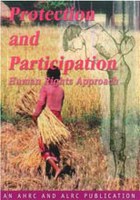 All attempts to improve the lives of people, particularly those who live in wretched conditions, involve two elements: protection and participation. The latter depends very much on the former.
All attempts to improve the lives of people, particularly those who live in wretched conditions, involve two elements: protection and participation. The latter depends very much on the former.
Discourses on development so far have almost always ignored the aspect of protection. The result is that talks on participation end up as rhetoric, incapable of achieving any results. Other buzzwords like “empowerment,” “self-help” and “sustainability” also suffer from the absence of concrete practical content. Where basic protection mechanisms have failed due to violence perpetrated by state agents such as police, or by goon squads and para-military groups under orders of local elites, the climate of intimidation that is created is not conducive to participation. Besides this, the absence of legal safe guards such as access to courts and other services make groups living in wretched conditions even more vulnerable. The result is that the fear of violence spreads deep among the more socially deprived people, and this obstructs their participation in finding solutions.
The linking of economic, social and cultural rights with civil and political rights very much depends on the way the contradictions between protection and participation are resolved. This principle must also be applied to the promotion of rights of women, where the factors of social repression and violence remains the same as before. In such situations the assertion of equality becomes practically impossible while legislation is sometimes passed intending to promote equality.
The work of Asian Human Rights Commission (AHRC) and its sister organization Asian Legal Resource Centre (ALRC) during the last 8 years has illustrated the link between protection and participation. We have worked extensively in several countries throughout Asia and we are in a position to demonstrate this link through practical experience.
Published in October 2003 by the Asian Human Rights Commission (AHRC) & Asian Legal Resource Centre (ALRC),
72 pages, Language: English. ISBN: 962-8314-21-1
This book is for free distribution, please write to ahrc@ahrc.asia to obtain a copy or
Click here to download this publication in PDF format.
Table of contents